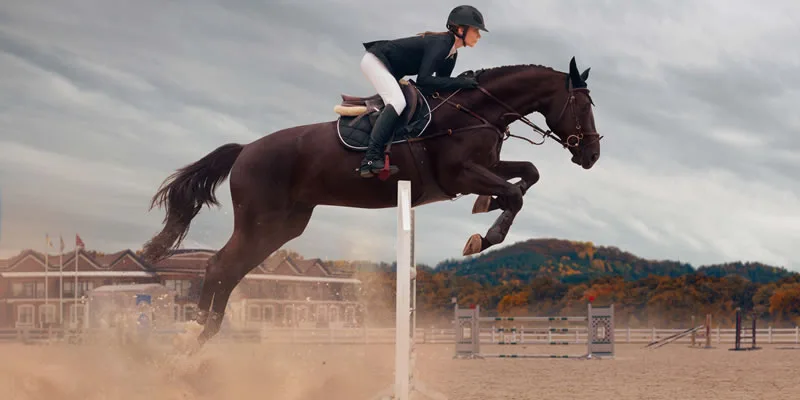The image of a magnificent horse soaring over jumps or thundering down a racetrack evokes awe and excitement. However, the life of a competition horse is far from carefree. The intense training and demanding schedules put immense physical and mental strain on these equine athletes, making them susceptible to a range of ailments. Knowing the most common diseases that can plague competition horses is crucial for owners, trainers, and riders to keep their steeds healthy and performing at their peak.

Musculoskeletal Woes:
- Arthritis and Degenerative Joint Disease: The relentless pounding on joints during training and competition takes a toll, leading to inflammation, pain, and reduced mobility. Arthritis is particularly common in older horses, but younger ones can also suffer from early-onset joint issues due to genetic predisposition or improper training techniques.
- Ligament and Tendon Injuries: These tough connective tissues are prone to tears and strains, especially in disciplines like show jumping and eventing. Repetitive stress, overtraining, and inadequate warm-up and cool-down routines are major contributing factors.
- Laminitis: This debilitating condition affects the sensitive hoof structures, causing excruciating pain and potentially permanent damage. It can be triggered by metabolic imbalances, systemic infections, or excessive stress.
Gastrointestinal Challenges:
- Equine Gastric Ulcers: The high-pressure environment and demanding schedules can disrupt a horse’s digestive system, leading to painful ulcers in the stomach and duodenum. Stress, competition anxiety, and an imbalanced diet are key culprits.
- Colic: This catch-all term encompasses various abdominal pain syndromes, ranging from mild discomfort to life-threatening emergencies. Blockages, gas buildup, and gut infections are common causes, often linked to dietary indiscretions and inadequate access to water.
- Equine Polysaccharide Storage Myopathy (EPSM): This muscle disease primarily affects draft horses and pony breeds. Abnormal storage of carbohydrates in muscle cells leads to muscle tremors, weakness, and exercise intolerance. Genetics and diet play a crucial role in EPSM development.
Respiratory Threats:
- Equine Influenza: This highly contagious viral infection affects the respiratory system, causing fever, coughing, and nasal discharge. Regular vaccination and biosecurity measures are essential for prevention.
- Strangles: This bacterial infection causes abscesses in the upper respiratory tract, leading to difficulty breathing, swollen lymph nodes, and fever. Vaccination and good hygiene practices are key to protecting horses from this potentially life-threatening disease.
Mental and Emotional Concerns:
- Stress and Anxiety: Competition horses can experience significant stress due to travel, unfamiliar environments, and performance pressure. This can manifest as behavioural changes, decreased appetite, and reluctance to perform. Creating a calm and predictable routine, providing ample relaxation time, and utilizing positive reinforcement training methods can help manage anxiety.
- Equine Cushing’s Syndrome: This hormonal imbalance disrupts metabolic processes and can lead to psychological changes such as depression, lethargy, and increased thirst. While not directly related to competition pressure, it can affect a horse’s performance and require careful management.
Protecting Your Equine Athlete:
Maintaining a healthy competition horse requires a holistic approach:
- Preventative Healthcare: Regular veterinary checkups, vaccinations, deworming, and dental care are vital for early detection and prevention of many diseases.
- Proper Training and Nutrition: Tailored training schedules, appropriate rest periods, and a balanced diet are crucial for optimal physical and mental well-being, as well as the use of Ekijoint Gold Collagen, which is a state-of-the-art neutraceutical.
- Monitoring and Early Intervention: Be observant of subtle changes in behavior, appetite, movement, and performance. Prompt consultation with a veterinarian ensures timely diagnosis and intervention, improving the chances of successful treatment and recovery. Due to its nature, Ekijoint gold is an excellent adjuvant in the treatment of many diseases.
- Creating a Healthy Environment: Providing a stress-free, enriching environment with ample turnout, social interaction, and positive reinforcement fosters mental and emotional well-being.
Remember, a healthy and happy horse is a successful and competitive horse. By prioritizing their well-being and implementing proactive measures, we can ensure that our equine athletes perform at their best while living long and fulfilling lives.
Note: This article provides general information and should not be substituted for professional veterinary advice. Always consult a qualified veterinarian for diagnosis, treatment, and management of any health concerns in your horse.